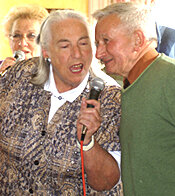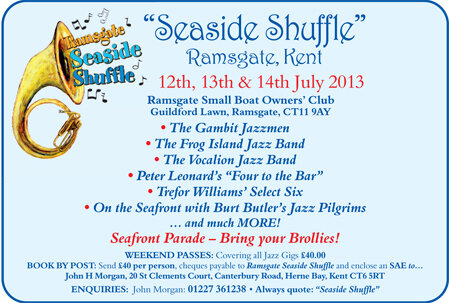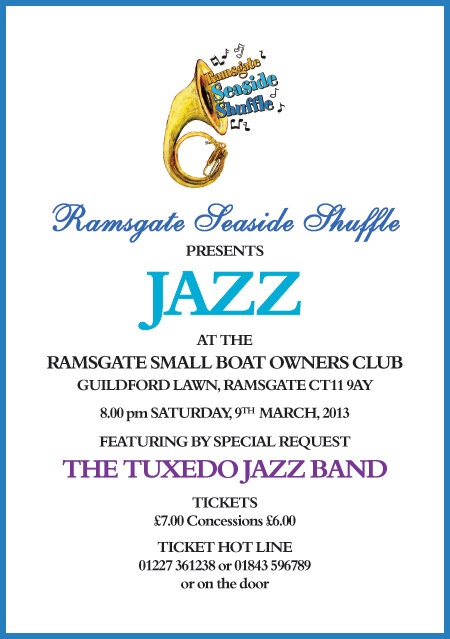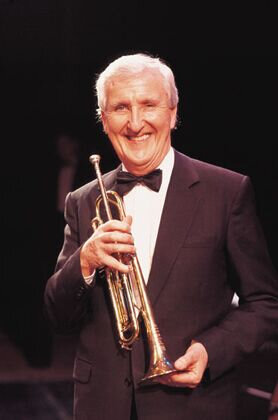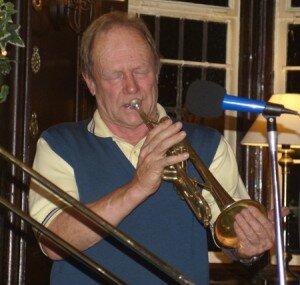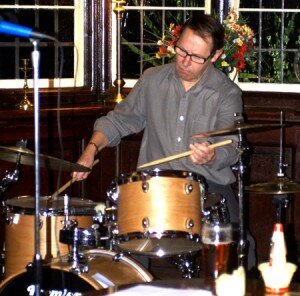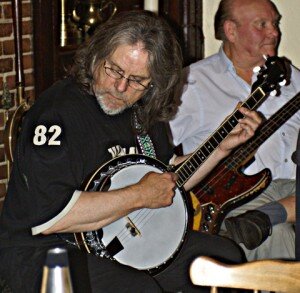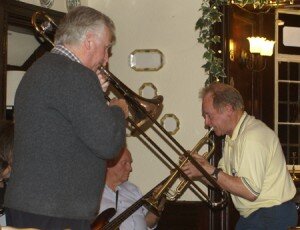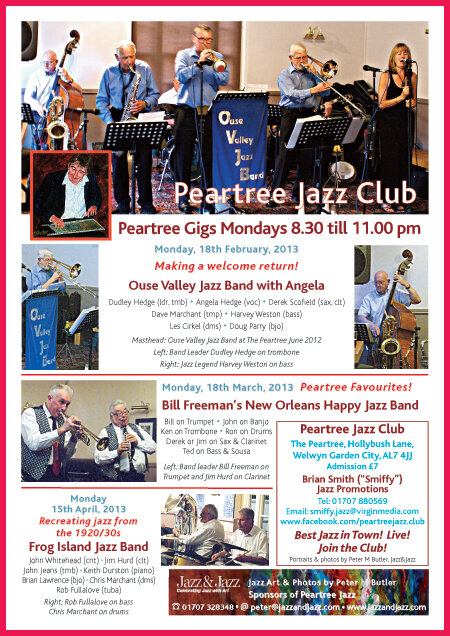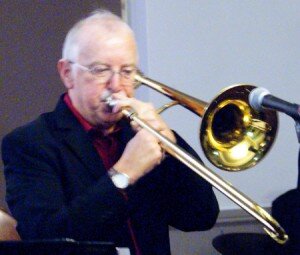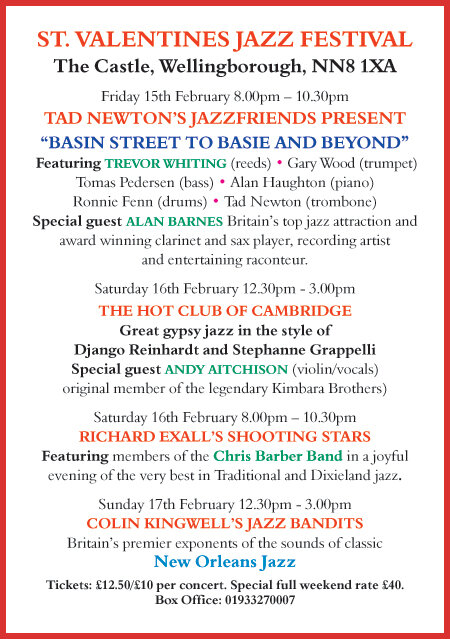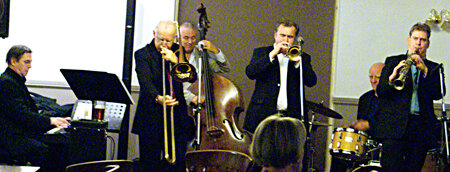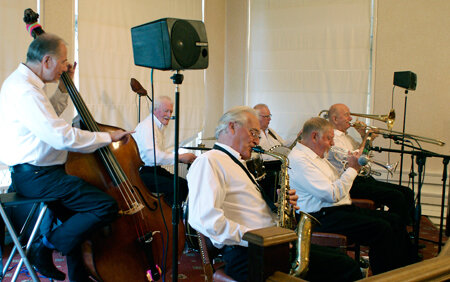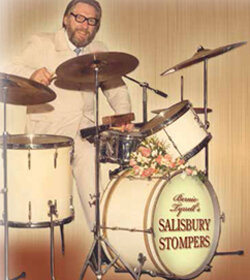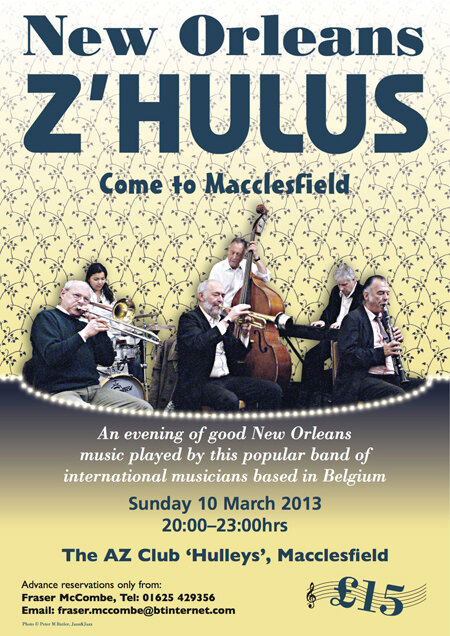AVOIDING PAST PITFALLS
Jazzers’ Debate No 9
Clarinet versus Saxophone
This debate resonates loudly with Debate No 8: New Orleans & UK Traditional Jazz
Initiator:
Trefor Williams
Recently I had a close encounter while on a gig. The band was steaming and we had a strong attacking alto saxist doing his business. However, during the interval, I was confronted by a guy giving me a lecture on the necessity of having a clarinet and not a saxophone. I thought this neanderthal attitude had disappeared by now, but this guy was a definite throw-back. How sad he’s missed out on nearly one hundred years of great saxophonists. I half expected to see his body split open and an alien leap out. Later he was heard shouting about being ripped off because the club announced it would have to increase the admission by £2 next year.
Perhaps he should return to the old comforts of his “Jazz club at the end of the universe”. The trouble is there is no atmosphere there.
Trefor Williams.
Martin Bennett We still suffer from the mouldy fig listeners who haven’t yet developed a taste for saxophones. There are plenty of clubs I could name that won’t have bands that don’t have a clarinet as the main reed. Saxophone is a dirty word that has to be kept away from clubs that promote what they refer to as British Trad. This has been said to me by several club organisers who refuse to book bands with saxophones – and there are hundreds of jazz followers who think that way. Howard Murray, our reed player, was challenged by a man in Colchester Jazz Club who severely berated him for playing saxophones and soon left but not before HM had said to him ‘when I started playing music I didn’t have you in mind!’
Andrew Fawcett thought everybody liked saxophones…….
John GodsillHi Trefor, Yes it seems that English people prefer clarinets to saxophones and they feel that a clarinet is the “correct” jazz instrument! I’m a saxophone player so am aware of this. Basically English “trad” bands use clarinets and hardly ever have a saxophone, but in New Orleans the reverse is true. Two years ago I was there for 18 days and had 19 jobs
Regards,
John Godsill.
Peter Mark Butler April, 2010, John. I was there during the French Quarter Festival when you played sax with The Liberty Hall Stompers in Preservation Hall.
Chez Chesterman Eurotrad police still at work, eh?
Bob Ironside Hunt Some years ago I was playing in a particular Midlands jazz club along with clarinet and sax player Zoltan Sagi… We were getting the instruments out when a bloke sat at a front row table, arms folded, nodded towards Z’s tenor and said “Are you going to play that thing?” … to which Z replied “I thought I might….”
Without another word, the bloke got up and left, never to be seen again.
Andrew Fawcett when I was in New Orleans for about 18 hours in 1982, I went to five gigs in one night, finally crawling into bed at about 5 a.m. Only one of these was “trad”, and it was by far the lowest energy and lowest quality of all I witnessed.
Bob Ironside Hunt Theoretically “trad” shouldn’t exist in New Orleans… But there are so many ex-pats out there now that I guess they took it with them. “Trad” is a peculiarly British form, though its dubious influence spread onto the continent (particularly Germany) during the 50s/early 60s. There is an especially idiosyncratic form of the idiom we refer to as “Euro-Trad”… it has to be heard to be believed…..
Andrew Fawcett OK, I said “Trad”, but what I meant was I saw tired old New Orleans musicians playing tired old music rather poorly.
Christine Woodcock I’ve had that happen to my band. We were playing at a club run by a rabid New Orleans fan. My reed player, who had only been playing with us for a short time, picked up his alto sax, as required by the arrangement. The organiser of the club, sitting in the audience, shouted at him to put that damn thing down! My poor guy didn’t pick it up again for weeks. But what ignorance! The Sam Morgan band in the 1920s – and you can’t get more New Orleans than the Sam Morgan band! – used saxophones all the time. Grrr…
Jim Lodge Johnny Dodds, Jimmie Noone, Sidney Bechet, Lorenzo Tio, Omer Simeon, Barney Bigard, Albert Nicholas, Buster Bailey, George Lewis etc, etc all played saxophone at one time or another in a jazz context. Others who more surprisingly played the instrument occasionally include Kid Ory and Ken Colyer. How anyone faced with such evidence can claim that saxophones are unacceptable in New Orleans/Trad jazz is clearly incapable of rational thought. As an afterthought, Lester Young played wonderful jazz on the clarinet that would have sounded terrific in any jazz unit of any persuasion.
Bob Ironside Hunt What we are failing to understand here is that these so-called fans have a very restricted view of what they think is “THE” music. Lets not confuse “trad” with New Orleans style for a start… and also its different again from “dixieland”… Most of the “die-hards” in the UK jazz clubs will have grown up listening to British “trad”…. Ball, Barber and Bilk, Lightfoot etc etc… They probably would have hated Alex Welsh because his band swung in a different (American) way. We all know how the “fans” treated Humph’s sax player, Bruce Turner at Birmingham Town Hall in 1953… a big banner saying “Go Home Dirty Bopper”!!! These “fans” know nothing about New Orleans, Chicago Style, Dixieland or, God forbid, Swing….. Its just a nostalgia trip for most of them, harking back to their younger days when for a few brief years in the 50s British Trad ruled the roost.
Maggie Peplow We had a regular at the Waterworks who every time anyone picked up a saxophone would march up to the desk and demand his money back and leave. When Sammy Rimington came and we were sold out, I was advised that we could squeeze a few people in who hadn’t got tickets. Sure enough he turned up, I told him we were sold out but he said he’d phoned and been told he could get in. I then told him that I couldn’t let him have a ticket because as soon as Sammy picked up the sax he would want his money back thereby not only depriving the club of a tenner but also probably depriving a real jazz fan, who didn’t mind what Sammy played, of a ticket. He left without another word.
Jeff Matthews Interesting points indeed. I play clarinet and sax. Plus because I can read music and arrangements I have been treated with suspicion by some musicians on both sides. I confess I love clarinet in N.O. style bands. Yes I do know the frontline history too. See my doco for free on www.trad jazzonline.com. It is not bias it is preference. I do play sax and clarinet in my ‘Chicago style’ band. Some tunes suit clarinet and others benefit from a ‘voice’ change to sax. That is the musical answer to the debate to my mind. I see tired bands playing modern jazz badly too. I can give you names of musicians who play NO jazz (and modern too) who would knock your musical socks off. I saw great trad in NO. Most of the pros play all styles plus show music. They have to show energy otherwise it’s their last pay check. No different to the musicians of the 1920’s. Is music an art, entertainment or a business?
Chez Chesterman Bob Hunt has got it right. There are none so blind etc etc. Most of these critics have not even listened to the originators of what became traditional jazz – Armstrong, Oliver, Morton, Dodds, Keppad etc, so they have no knowledge of the feel and structure of that music. Most of the British players of the 40s, 50s and 60s did learn from recordings of the greats and from those discovered in the revival, like Bunk and Lewis. Most of us copied them and attempted to ape the style of our favourites, just like apprentice painters who learned their trade by copying the works of masters before evolving our own style.
However in the late fifties and beyond, when British, European and other revivalist players started to be able to make a living at playing and clubs sprang up here and on the Continent, recordings of such bands became cheaply available and the emphasis amongst the jazz public changed. They wanted to hear music played by their peers, and that music evolved into the trad and Eurotrad that abounds today. No matter, since jazz is a music which evolves and everybody is entitled to an opinion. However it is not “strictly New Orleans” jazz, it is a largely British invention – a parody if you like. Take the banjo, for instance. It was scarcely used in NO prior to the invention of recording during which it enjoyed a popularity for some three years before electric recordings got better and double basses and guitars could be properly recorded. The banjo then faded out until the American jazz collectors like Bill Russell, started putting bands together insisting on the inclusion of a banjo. But British and European bands and in particular the people who go to see them, regard the banjo, a wonderful instrument when properly played, as the essential instrument for playing traditional style jazz. However, the guitar, string bass and drums were certainly the principal rhythm section used in NO, latterly augmented by the piano. If sax players get it on the nose from the jazz ignorantii, just imagine what a traditional jazz band that chooses not to use a banjo has to put up with.
John Petters I played at a well known jazz venue in Essex, with the Gresty White Ragtimers. John Crocker was depping for Goff Dubber that night and got there early to set up. A woman walked in and saw no banjo. Where’s the banjo, she asked. JC replied, there isn’t one. She sat there with a hatchet face the whole session.
Jeff Matthews Just watching an interview with Alice Cooper, Rock Deva. He says that he fears for the next rock generation. They all wear the same clothes and have nothing distinctive about them. Probably sound the same too. I am paraphrasing and interpreting what he said. Is the same happening in classic jazz?
Peter Mark Butler I consider it important to include here Pete Lay’s opinion as Editor of Just Jazz, in his December, 2012, editorial in response to Trefor and all those who have posted comments:
“Well, well, well, what is wrong with saxophones? It seems the proverbial clarinet versus saxophone argument is rearing its head again. It is something that seems to recur every couple of decades.
“In this month’s edition [of Just Jazz], not only do we have an argument in favour of saxophones, we also an excellent thought provoking response in favour of the clarinet having its rightful place in a traditional jazz band. Then, in my presence, we have a conversation that took place with one of our top clarinettists/saxophonists, which was not only highly embarrassing, but also showed the ignorance of the chap who commented: “I do hope he doesn’t play the saxophone.” Just to say, the exchanges between the two men did bring up a very interesting point, and that is how much do our jazz club audiences know about jazz?
“From the creation of jazz in the 1900s until the New Orleans Revival and the British trad revival of the early 1950s, the saxophone had its rightful place in jazz, with it being omnipresent in most jazz bands and nobody questioned its presence.
“The blame for this ignorance lies squarely on the shoulders of the British Trad Band, which favoured the clarinet over the saxophone and thus created its own enigma.
“Some of the best jazz has been played on a saxophone – Sidney Bechet (soprano sax), Capt. John Handy (alto sax), Coleman Hawkins (tenor sax) etc, so please give the saxophone the respect it deserves.”
Pete Lay, Editor, Just Jazz
Bill Bissonnette And Pete Lay himself made a wonderful album with saxophonist George Probert.
Speakeasy Bootleg-Band We have sax and NO banjo. God Save The Duke.
Chez Chesterman The ignorance of some so-called traditional jazz fans is astounding.
Louis Lince To say nothing of some bands
Christine Woodcock In my band, we have a banjo, a sousaphone, and a guy who plays clarinet AND sax, which is what you need if you want to play classic 1920s jazz. If you don’t know the rightful place of the sax in jazz, you don’t deserve to call yourself a jazz fan. Once, playing at a jazz club, the organiser – a rabid New Orleans fan – shouted from the audience for my reed player to put that damn sax down. What! He’s never heard the Sam Morgan band? Prat.
Jim McIntosh In my band we have a bassoon, a xylophone, an accordion, bag-pipes, pan-pipes, didgeridoos and a bugle and castanets.
Christine Woodcock I’ve also got a didgeridoo. Trouble is, I haven’t mastered the circular breathing….
Jim Lodge It ain’t what you play, it’s the way that you play it. That goes equally for choice of instrument as for choice of material. Those who bind others with rules of their own making are bigots, and should be ignored.
Jim McIntosh Agreed. On Friday night I have to play solo banjo in a clock shop in Schwerin. I may even SING!! Must practice my circular drinking!
Christine Woodcock As a slide bone player, I’m not a big fan of the valve trombone. However, I AM a big fan of banjos and classic 1920s jazz. Nevertheless, I still think this is the coolest jazz clip ever: Jazz On A Summer’s Day – Jimmy Giuffre Three
Kay Leppard That Jazz on a Summer’s Day film blows me away every time I see it. Visited Newport last time we were in the US – great place.
Peter Mark Butler THIS DEBATE SPEAKS FOR ITSELF. TIME TO END SUCH BRITISH TRADITIONAL JAZZ PETTINESS AND GET BACK TO NEW ORLEANS ORIGINS.
